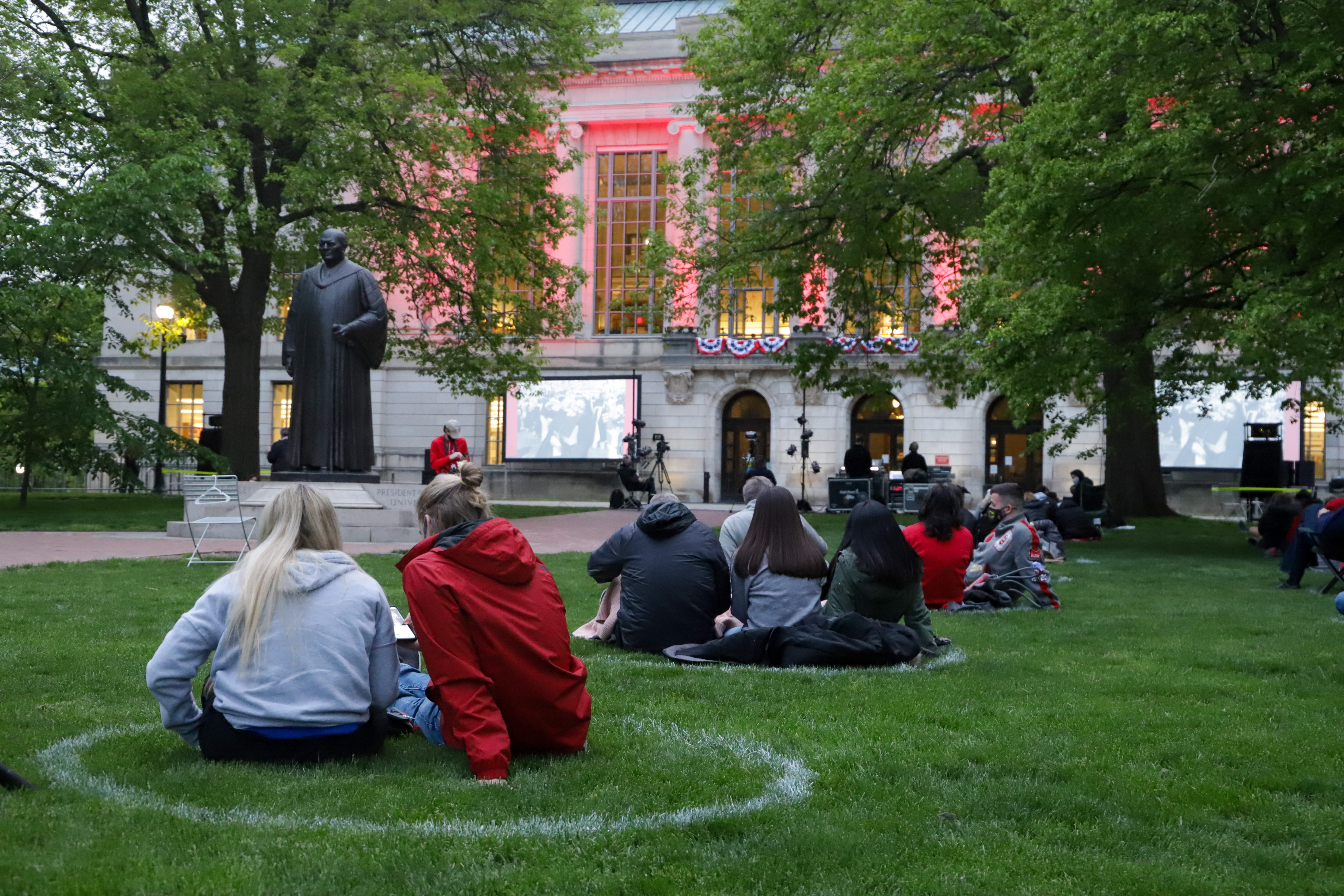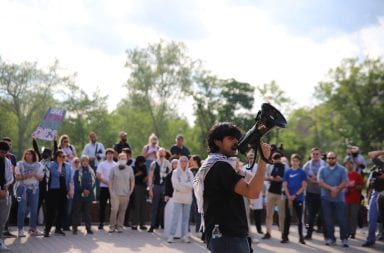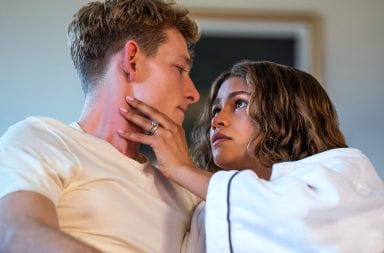
Ohio State students sit in social distanced circles during the Commencement Candlelight Ceremony on May 8 on the Oval. Credit: Lantern File Photo
2020 was a year of firsts for many: the first pandemic in several generations, and for the class of 2024, the very first semester of college, which commenced mere months after the world around it came to a halt.
On March 8, 2020, Ohio State suspended face-to-face instruction, according to previous Lantern reporting, and on March 22, 2020, Ohio Gov. Mike DeWine announced a stay-at-home order to stop the spread of the coronavirus.
Just months after the campus shut down, Ohio State reopened in August 2020 and welcomed the class of 2024. However, many students opted to stay home.
Katie Jennings, a fourth-year in public policy analysis, said one of the first big college decisions she had to make was spending her freshman year online, at home, to keep her immunocompromised family members safe.
“For me, freshman year, [my] first year of college, was being on a computer — being on Zoom,” Jennings said. “Hanging out in my childhood bedroom, being on a Zoom call for what felt like near 24/7.”
As an online student, Jennings said she worked to stay connected to campus and get involved by finding student organizations that met virtually. She did this through the involvement fair, which was a completely different experience from what it is now, she said.
“Imagine a website with a bunch of different links to different various student [organizations] and you click on it, and they send you to a Zoom link, and that was the closest you could get to interacting with other students,” Jennings said.
Even with her college experience limited to a computer screen, Jennings said she still wanted to make connections with new people. She joined the Undergraduate Student Government and was involved in the Humanities Scholars Program, which allowed her to meet people virtually.
“That was how I really connected to campus and tried to make friends,” Jennings said.
Kate McCanna, a fourth-year in arts management and theater, said she was excited to come to Ohio State, her dream school. Though the move from her home state of North Carolina was far, McCanna had been in lockdown for five months and was ready for a change, but things became harder after her roommate, another out-of-state student, moved back home, leaving her alone in her dorm room.
McCanna said while having the room to herself was nice, it quickly became lonely and she struggled to think of something other than the pandemic and how hard it was for her to travel back home.
“I was like, ‘Oh my gosh, am I going to stay here?’” she said. “‘Am I still gonna be at Ohio State in a year?’”
McCanna joined Off the Lake Productions, Ohio State’s student-run, service-based theater organization of which she is now president, and remembers how everyone tried their best to bring the theater experience online. Members of the organization met virtually and performed through Zoom and YouTube, McCanna said.
“The only time we met in person was one last end-of-year meeting that a few of us got together for when we could because of university guidelines, but it was all on Zoom,” McCanna said.
Connor Telford, who graduated in December with bachelor’s degrees in film studies and English, said it was really hard to meet people during the pandemic even while living on campus, because all of his classes were asynchronous and he hung out with only three or four close friends on his dorm floor.
“All the other opportunities where you would typically go to meet other people and kind of find your path in undergrad, that was just all distanced, and so as a result, it was just really hard to meet people,” Telford said.
Telford said he wore a mask everywhere he went besides his dorm room. Making the trip across campus to Jesse Owens North to take a coronavirus test every week was a welcomed change of pace, Telford said.
“I didn’t mind because it made me feel like I was actually going out and being on campus,” he said.
Limited to his dorm the first year, he said he became as involved there as he could and met some of his closest friends. Telford said this led him to join the Humanities Scholars Leadership Council and become a resident adviser when he returned for his second year.
When the new year came, vaccines became widely available on campus and restrictions started to lift, he said. Clubs began to meet in person again, classes were offered in person, students could gather in large groups and the Involvement Fair was held in person, Telford said.
“I remember how everybody kind of celebrated when they made the vaccines available to us,” Telford said.
McCanna said that when restrictions began to be lifted, with the threat of COVID-19 still ever-present, she felt some fear and hesitancy towards going out.
“I was like, ‘Guys, I don’t want to go anywhere,’” she said. “‘I’m so used to wearing masks, I feel weird without it on.’”
This led McCanna to discover her passion for the behind-the-scenes aspects of theater production because she could wear a mask and she was not as interested in being on stage, she said.
“I used to act in high school, but then after [COVID-19], I was like, ‘No, I don’t want to go back on stage. I’m not going to do it,’” McCanna said.
As the mask mandates were lifted and clubs could meet together in person, McCanna said she jumped on the opportunity.
“I just wanted to get involved and have somewhat of a normal college experience,” McCanna said.
Jennings said she came to live on campus in a dorm for her second and third years to get the experience she lost during her first year of isolation.
“I had only had that one year to meet people and so I wanted that second-year opportunity to meet people,” Jennings said.
Even when things returned to normal, she said COVID-19 still had a profound impact on her. It created a lot of uncertainty, Jennings said, which in part influenced her to look for a major with stability, where she found public policy analysis.
“It made me want a career that had certainty in it, and my hope was that public affairs, public policy, would be that route because we need people to run the government,” Jennings said.
Even today, Jennings said she still has COVID-19 test kits in her room and a plan with her roommates for what to do if someone gets sick.
“It’s really made us prioritize communication and transparency,” Jennings said.
Telford said it’s hard to think of a college experience without the pandemic, which made him feel more aware of himself and the world around him.
“It so thoroughly dominated everything,” he said. “I’m not sure what would have happened or where I would have ended up.”
McCanna said that it is unbelievable she gets to graduate as a Buckeye and that if there is one thing she learned from her experience through the pandemic, it’s the importance of kindness.
“I think it’s taught me to just take a moment to just be kind to other people and never say no to helping somebody out if you have the time and you have the means,” McCanna said.
Jennings said the pandemic showed her that everyone is stronger than they think they are, and that college goes by fast, even with the chaos of a pandemic, and to take in every experience to the fullest.
“There’s so much that happens in four years,” she said.
Jennings said starting college during the pandemic and going from being unable to look past the next month amid the pandemic to getting ready to graduate is hard to describe.
Jennings said her family felt this way as well.
“When I took them to their first OSU college game, as a family, my mom cried when she made it to the stadium because she didn’t, like me, expect herself to be able to go experience a family event with all of us at college,” Jennings said. “So it’s very surreal.”


